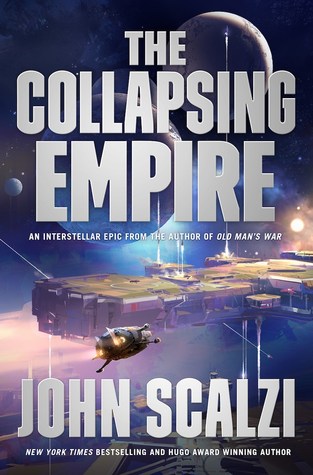 The Collapsing Empire by John Scalzi
The Collapsing Empire by John Scalzi Series: The Collapsing Empire #1
Published by Tor Books on March 21st 2017
Pages: 333
Our reviews of this author: The Dispatcher





Honestly, I don’t understand why there aren’t more science fiction writers like John Scalzi. I don’t need all science fiction to be written Scalzi style, but I do need more than we’ve got.
Opening a review this way should give you a sense that I very much enjoyed The Collapsing Empire. It is, in many ways, a traditional space opera, full of imaginative technology, vivid world-building, and enormous stakes. On the other hand, it’s just plain fun to read. And it’s this latter reason that I habitually read anything by Scalzi the minute it’s published. Virtually every other notable science fiction author you can think of has him beat hands-down in the big idea department. Scalzi has imaginative concepts, sure, but there’s also always something entirely familiar and comfortable about his fictional worlds. They are populated by recognizable character types – none of them being altered or warped by alienness or futurity into something truly other. His books also feature sci fi technology that, underneath the hood, feel familiar and contemporary. If you want never-before-conceived-of science fictional musings that brilliantly speculate on how technology or climate or evolution might change humanity, look elsewhere. If you want to have a good time, climb on board.
In his latest novel, the first of a series, is set in the far future. We are introduced to several main characters, all of whom are fun to follow for their own reasons. We first meet Cardenia Wu-Patrick, the failing emperox’s (gender-neutral future speak for “emperor”) illegitimate daughter, as she sits by her father’s death-bed preparing herself for the unexpected role of being the new emperox. Her father’s heir has recently died in a car crash (feels contemporary, right?), and now she finds herself the heir of the long-ruling house of Wu. What Caredenia does not yet know, but the reader who has observed the book’s title will suspect, is that the empire is on the verge of collapse.
This is a far-flung human civilization linked by something called the Flow, a “multidimensional brane-like metacosmological structure that intersects with local time-space in a topographically complex manner.” In other words, it’s the convenient handwavium that allows for getting around the impossibility of faster-than-light travel. Millennia ago, Earth somehow fell out of the Flow, and now human culture exists on various habitats built entirely because they provide convenient Flow access. Soon into her reign as empire, Cardenia learns that things are about to change.
The book follows a handful of other principal characters, including Kiva Lagos, a foul-mouthed operative for her own important family’s trade operations, and Marce Claremont, a physicist whose father has spent his life studying the reasons that the empire is on the verge of collapse. All three of these characters will run afoul of the Nohamapetan family, a venerable clan which knows something of the big changes that are coming and is looking to reposition itself within the galactic pecking order.
Within all these imaginative worlds, scientific shifts, and political posturing are the seeds for good old fashioned scheming, deception, and double-crossing. The Collapsing Empire is, at heart, a political story filled with likably flawed and overwhelmed heroes pitted against scheming and over-reaching villains. Everyone is struggling in his or her own way. Also, everyone is very, very witty. Maybe the most distracting thing about the book is the universal linguistic deftness. No matter the seriousness or unexpected severity of a crises, virtually all of Scalzi’s characters are ready with a hilarious observation or comeback.
This cleverness may sometimes stretched credulity, but it is also part of what makes Scalzi’s books so much fun to read. There is no whirlwind world-building here where the reader is asked to wade through dozens of pages before gaining a working understanding of how the fictional universe operates. We get what we need to know, and it’s usually pretty easily digested. Then it’s on to the curious turning of pages.
One of the criticisms sure to be lodged at this book is that it feels like a quick opening move in a much larger story. That may be fair, but I also didn’t mind. The author has produced a thoroughly enjoyable science fictional romp, and I will happily devour the next volume when it hits the stores.
- Review: The Collapsing Empire by John Scalzi - April 12, 2017
- Review: All our Wrong Todays by Elan Mastai - January 30, 2017
- Review: The Heart of What Was Lost by Tad Williams - December 28, 2016


No Comments
Comments are closed.